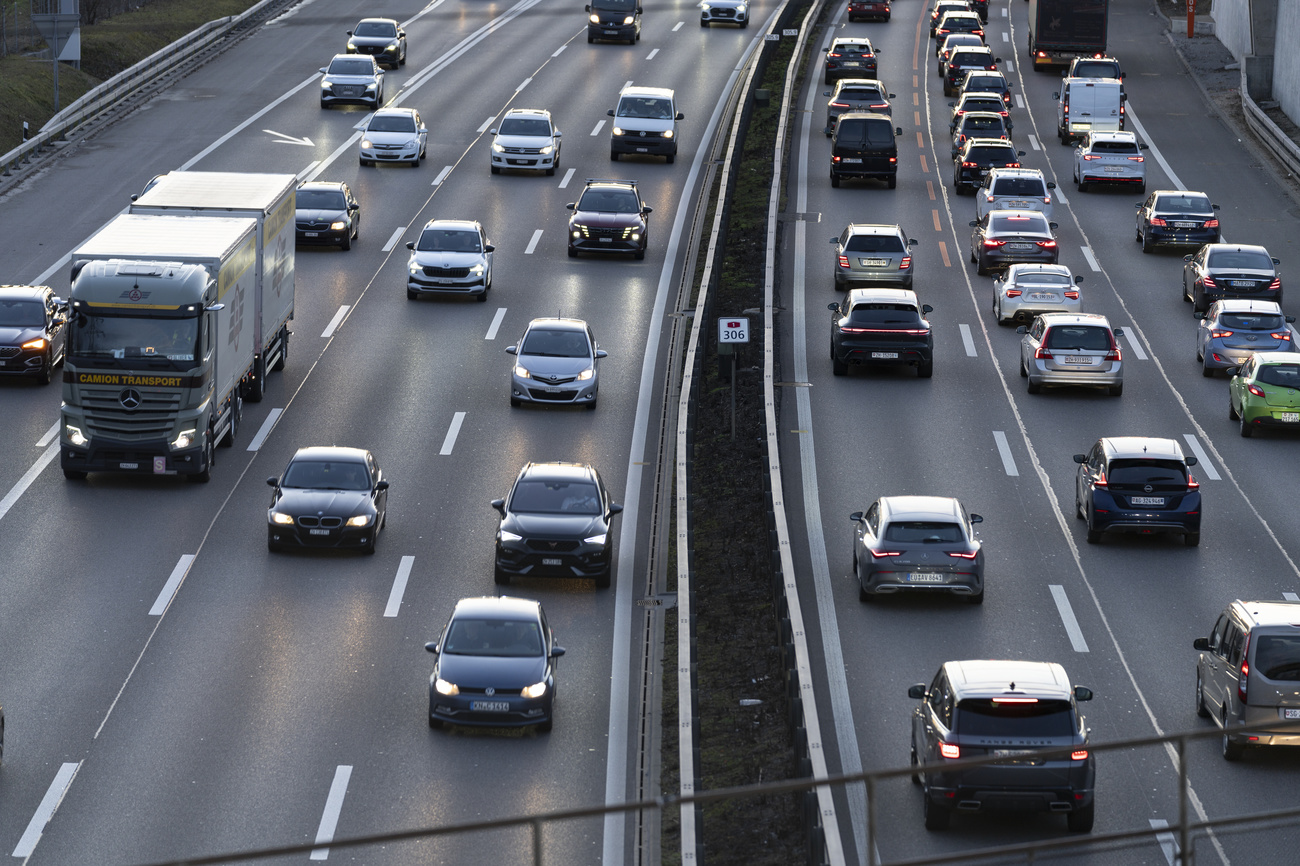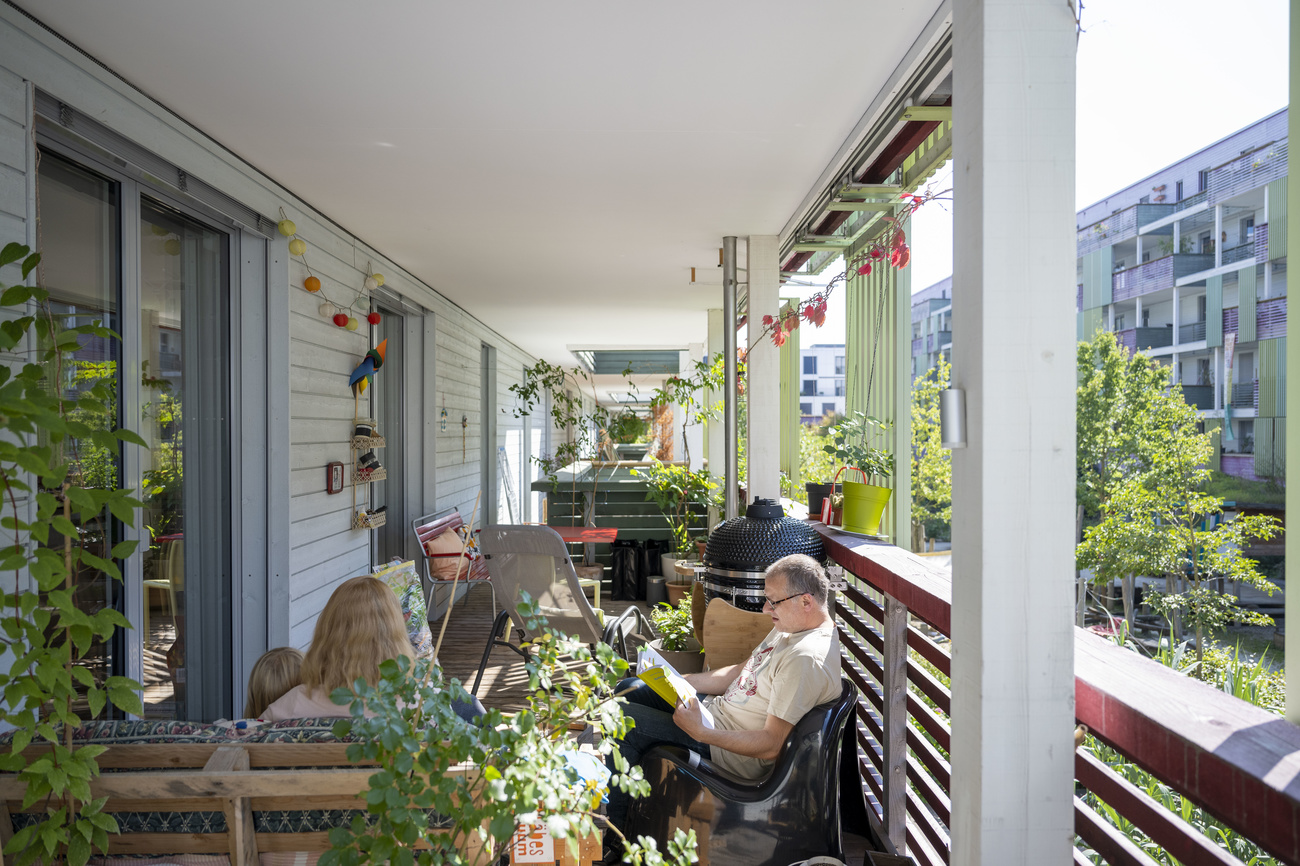
Swiss Abroad more favourable towards motorway expansion

The Swiss Abroad are much more in favour of expanding the motorway network than respondents in Switzerland. This is shown by the first survey by the Swiss Broadcasting Corporation (SBC), SWI swissinfo.ch's parent company, on the November 24 vote.
It’s an exception to the norm. As a rule, the Swiss Abroad are much more environmentally conscious in their voting behaviour than residents. But in this instance the majority polled want to vote for highway expansion – almost 10% more than those surveyed in Switzerland.
Why is that? Political scientist Martina Mousson from polling research institute gfs.bern doesn’t know the answer either. “That contradicts the pattern,” she says.
There is one possible explanation but it’s a flimsy one. Normally, the Swiss diaspora is more likely to follow the government’s position in votes than the domestic population. According to Mousson, this can explain part of the discrepancy, but not all of it. The fact that the Swiss Abroad will not have to pay for the planned expansion because they pay taxes elsewhere is also hardly a sufficient explanation.
‘Stronger impression of density’
The reason may lie in personal perception. Switzerland has become more densely populated. This is noticeable to anyone driving onto the Swiss motorway network from abroad.
Swiss Abroad Peter Segessenmann describes precisely this perception in the Let’s Talk episode (in German) on the expansion of the motorway network. “As soon as I’m in Switzerland and have to use the car, I’m stuck in a traffic jam.” This is in contrast to Portugal, where the Swiss pensioner lives.
Political scientist Mousson says: “Perhaps there is a stronger impression of density among the Swiss Abroad.” If this is confirmed, it would be a striking shift in the political orientation of the Swiss diaspora. So far, population density in Switzerland has not been a significant concern for this important electorate. Whether it has become one remains to be seen.
In any case, this is the most striking finding from the results of the first wave of surveys conducted by gfs.bern on the four proposals on which the Swiss electorate will vote on November 24. They concern motorways, two amendments to tenancy law and one on healthcare.
‘Opinion is only just beginning to form’
The survey was conducted seven weeks before the referendum. “The referendum campaign and the formation of opinions are only just beginning; the effects of the mobilisation through the campaigns are still unknown,” say the pollsters from gfs.bern about the first poll results.
Among the electorate as a whole, opinions are best developed on the motorway expansion bill and less so on the two rental law bills. What is striking here is that the two related proposals were not yet perceived by respondents as the overall package that the opponents have now put together in the campaign. Little progress has been made in forming an opinion on the complex bill on uniform financing in the healthcare system.
Motorway expansion polarises opinion
Political scientist Mousson notices that opinion on the expansion of the motorways is strongly polarised between left and right. Women are against the expansion, while the majority of men are in favour.
The strongest argument of all in the survey was one of the opponents’ guiding principles: “If you sow roads, you reap traffic.” The majority, 56%, of all respondents agreed with this statement. However, two arguments put forward by supporters also scored very well: “The expansion is necessary” and “Our motorway network was built for six million people, today nine million use it.”
Everything to play for on tenancy law
According to the opinion researchers at gfs.bern, there is still room for movement on the two proposals on tenancy law.
While the proposed amendment to the law on subletting is still trending in favour at the moment, Mousson believes the situation regarding the adjustment of personal use is on a knife edge. “If sampling errors are taken into account, it’s currently a stalemate,” she says.
However, the opponents’ campaign has not yet been rolled out. And there is one argument in particular that, according to Mousson, could still have an impact: “This is an attack on tenant protection”. If this interpretation prevails, it could be highly effective for a voting decision because “individual concern always plays a role”, according to Mousson, and Switzerland is a nation of tenants.

“If the opponents succeed in anchoring this view in the population, it could still be tight for both rental law proposals,” concludes Mousson. The voting intentions of Swiss citizens abroad hardly differ from those in Switzerland when it comes to the rental law proposals.
Healthcare financing: the government must act
The researchers at gfs.Bern also believe the race is wide open for the bill on the uniform financing of outpatient and inpatient healthcare services. Although it still looks like a comfortable yes vote of 60%, it still has potential to surprise.
“Many will decide on the basis of their own cost-benefit considerations,” says Lukas Golder from gfs.bern. Better information is still needed and Golder sees the complexity of the proposal as its weak point.
“It is difficult to communicate exactly what it will achieve and it is a relatively abstract idea to tackle the problem of disincentives in the healthcare system,” he says. This opens the door for the trade unions to argue that uncertainty will arise if it is adopted. “Only if the government and parliament present their arguments well will they have a chance to fight against it,” says Golder.
‘What the left is achieving is historic’
According to Golder, the cushion of trust in the government is lacking at the moment, with trade unions and the political left currently having a run at the polls.
“What the left is achieving at the moment is historic,” he says. “It is succeeding in winning over sections of the population that are not aligned with it”.
The pattern that emerged with the 13th old-age pension payment and the pension reform could therefore be repeated with the healthcare financing and the rental law proposals. Perhaps what they can no longer achieve in parliament, the left will get at the ballot box.
The gfs.bern institute surveyed 11,183 voters between September 30 and October 14, 2024, for the first poll in the run-up to the federal vote on November 24. The statistical margin of error is 2.8 percentage points.
Adapted from German by DeepL/ac

In compliance with the JTI standards
More: SWI swissinfo.ch certified by the Journalism Trust Initiative































You can find an overview of ongoing debates with our journalists here . Please join us!
If you want to start a conversation about a topic raised in this article or want to report factual errors, email us at english@swissinfo.ch.